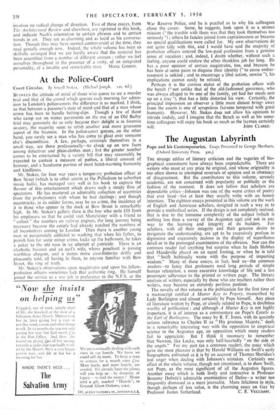At the Police-Court
BETWEEN the attitude of mind of those w:to queue to see a murder trial and that of the crowd which queues each morning for admis- sion to London's police-courts the difference is as marked, I think, as that between a poisoner's state of mind and that of a man whose crime has been to handle betting-slips. Though a few of those who camp out on winter pavements on the eve of an Old Bailey trial may genuinely do so only because their delight is in forensic oratory, the majority seem to relish another and more gruesome aspect of the business. In the police-court queues, on the other hand, you rarely see a man who has come to-gloat over someone else's discomfiture. A few, perhaps, criminals themselves in a small way, are there professionally—to check up on new faces among detectives and plain-clothes men ; but the greater number comes to be entertained by a variety bill that may reasonably be expected to contain a measure of pathos, a liberal amount of humour, and a handsome portion of most hedit-warming humanity and kindliness.
Mr. Stokes, for four war years a temporary probation officer at Bow Street (which is to other courts as the Palladium to suburban music halls), has managed very well in his book to capture the flavour of this entertainment which draws such a steady flow of spectators. He has mustered an admirable collection of eccentrics from the probationers with whom he had dealings ; and though eccentricity, in its milder forms, may be no crime, the incidence of it in those who appear in the dock at Bow Street is remarkably high. In Mr. Stokes's gallery there is the boy who stole flO from his employers so that he could visit Manchester with a friend to " collect " the numbers on railway engines, the long journey being necessary because the couple had already notched the numbers of all locomotives coming to London Then there is another young man so passionately addicted to washing that when his father, to punish him for some minor crime, locks up the bathroom, he takes a poker to the old man in an attempt at patricide. There is an alcoholic baronet and an earl's wife, whose penchant is passing worthless cheques, and a dozen more case-histories deftly and pleasantly told, all having in them, to anyone familiar with Bow Street, the ring of truth.
Mr. Stokes's observations upon magistrates and upon his fellow- probation officers sometimes lack that authentic ring. He himself joined the service as a war job in preference to the N.F.S. or the War Reserve Police, and he is puzzled as to why his colleagues chose the career. Some, he suggests, look upon it as a serious mission (" the trouble with them was that they took themselves too seriously ") ; others he fancies joined from capriciousness or because no special qualifications were called for. My own observations do not quite tally with this, and I would have said the majority of probation officers entered the low-paid profession from a genuine sense of vocation ; and, indeed, I doubt whether, without such a feeling, anyone could endure the often thankless job for long. He has a poor opinion of certain magistrates, too, and because he has been at.some pains to disguise their identity (" to cause embar- rassment is unkind ; and to encourage a libel action, unwise "), his implications cannot easily be refuted.
Perhaps it is the curious status of the probation officer with the bench (" not unlike that of the old-fashioned governess, who was always alleged to be one of the family, yet had her meals sent up on a tray "), that has a little distorted his view. Certainly, the principal impression an observer a little more distant bringr, away from the courts is one of scrupulous fairness tempered with great humanity. However, Mr. Stokes cloys not allow his opinions to intrude unduly, and I imagine that the Bench as well as his some- time colleagues will enjoy his book as much as the layman certainly


































 Previous page
Previous page